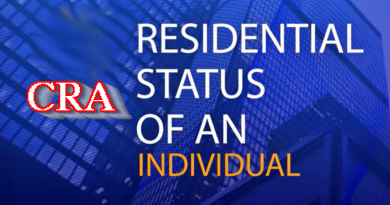S5-F1-C1: Determining an Individual’s Residence Status
1.13 If an individual who is married or cohabiting with a common-law partner leaves Canada, but his or her spouse orcommon-law partner remains in Canada, then that spouse or common-law partner will usually be a significant residential tie with Canada during the individual’s absence from Canada. Similarly, if an individual with dependants leaves Canada, but his or her dependants remain behind, then those dependants will usually be considered to be a significant residential tie with Canada while the individual is abroad. Where an individual was living separate and apart from his or her spouse or common-law partner prior to leaving Canada, by reason of a breakdown of their marriage orcommon-law partnership, that spouse or common-law partner will not be considered to be a significant tie with Canada.
Secondary residential ties
1.14 Generally, secondary residential ties must be looked at collectively in order to evaluate the significance of any one such tie. For this reason, it would be unusual for a single secondary residential tie with Canada to be sufficient on its own to lead to a determination that an individual is factually resident in Canada while abroad. Secondary residential ties that will be taken into account in determining the residence status of an individual while outside Canada are:
- personal property in Canada (such as furniture, clothing, automobiles, and recreational vehicles);
- social ties with Canada (such as memberships in Canadian recreational or religious organizations);
- economic ties with Canada (such as employment with a Canadian employer and active involvement in a Canadian business, and Canadian bank accounts, retirement savings plans, credit cards, and securities accounts);
- landed immigrant status or appropriate work permits in Canada;
- hospitalization and medical insurance coverage from a province or territory of Canada;
- a driver’s license from a province or territory of Canada;
- a vehicle registered in a province or territory of Canada;
- a seasonal dwelling place in Canada or a leased dwelling place referred to in ¶1.12;
- a Canadian passport; and
- memberships in Canadian unions or professional organizations.
Other residential ties
1.15 Other residential ties that the Courts have considered in determining the residence status of an individual while outside Canada, and which may be taken into account by the CRA, include the retention of a Canadian mailing address, post office box, or safety deposit box, personal stationery (including business cards) showing a Canadian address, telephone listings in Canada, and local (Canadian) newspaper and magazine subscriptions. These residential ties are generally of limited importance except when taken together with other residential ties, or with other factors such as those described in ¶1.16.
Application of term ordinarily resident
1.16 Where an individual has not severed all of his or her residential ties with Canada, but is physically absent from Canada for a considerable period of time (that is, for a period of time extending over several months or years), the Courts have generally focused on the term ordinarily resident in determining the individual’s residence status while abroad. The strong trend in decisions of the Courts on this issue is to regard temporary absence from Canada, even on an extended basis, as insufficient to avoid Canadian residence for tax purposes. Accordingly, where an individual maintains residential ties with Canada while abroad, the following factors will be taken into account in evaluating the significance of those ties:
- evidence of intention to permanently sever residential ties with Canada;
- regularity and length of visits to Canada; and
- residential ties outside Canada.
For greater certainty, the CRA does not consider that intention to return to Canada, in and of itself and in the absence of any residential ties, is a factor whose presence is sufficient to lead to a determination that an individual is resident in Canada while abroad.
Evidence of intention to permanently sever residential ties
1.17 Whether an individual intended to permanently sever residential ties with Canada at the time of his or her departure from Canada is a question of fact to be determined with regard to all of the circumstances of each case. Although length of stay abroad is one factor to be considered in making this determination (that is, as evidence of the individual’s intentions upon leaving Canada), the Courts have indicated that there is no particular length of stay abroad that necessarily results in an individual becoming a non-resident. Generally, if there is evidence that an individual’s return to Canada was foreseen at the time of his or her departure, the CRA will attach more significance to the individual’s remaining residential ties with Canada (see ¶1.11 – 1.15), in determining whether the individual continued to be a factual resident of Canada subsequent to his or her departure. For example, where, at the time of an individual’s departure from Canada, there exists a contract for employment in Canada if and when the individual returns to Canada, the CRA will consider this to be evidence that the individual’s return to Canada was foreseen at the time of departure. However, the CRA would have to review each individual’s situation on a case-by-case basis to determine whether the individual’s remaining residential ties with Canada, including the contract of employment, are sufficient to conclude that the individual continues to be resident in Canada.
Steps taken to comply with the Act
1.18 Another factor that the CRA will consider in determining whether an individual intended to permanently sever all residential ties with Canada at the time of his or her departure from Canada, is whether the individual took into account and complied with the provisions of the Act dealing with the taxation of:
- individuals ceasing to be resident in Canada; and
- individuals who are not resident in Canada.
For example, upon ceasing to be resident in Canada, an individual is required to either pay, or post acceptable security for, the Canadian tax payable with respect to capital gains arising from the deemed disposition of all of the individual’s property (with the exception of certain types of property that are listed in subsection 128.1(4)(b)). Where applicable, the CRA will look at whether this requirement has been met as an indication of the individual’s intention to permanently sever his or her residential ties with Canada at the time the individual left Canada.





